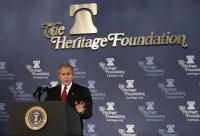-
Gene-drive modified organisms not yet ready to be released into environment: Scientists
The emerging science of gene drives has the potential to address environmental and public health challenges, but gene-drive modified organisms are not ready to be released into the environment and require more research in laboratories and highly controlled field trials, says a new report from the National Academies of Sciences.
-
-
Do think-tanks matter? Expert says “think again”

A recently published study found that public sector workers judged studies and reports generated by scholars affiliated with universities to be more credible than reports or studies purported to be from a think-tank or advocacy group.
-
-
DHS report highlights R&D priorities for technologies used in the field

The Department of Homeland Security has released the Integrated Product Teams for Department of Homeland Security R&D Fiscal Year 2016 Report. The report identifies twenty-four focus areas for technological research and development (R&D), which fall under five mission areas: aviation security, biological threats, border security, cybersecurity, and counterterrorism.
-
-
U.S. R&D increased in 2013, ahead of the pace of gross domestic product
U.S. expenditures in research and development (R&D) rose to $456.1 billion in 2013 — a $20.7 billion increase over the previous year, according to a report from the National Science Foundation. The R&D system in the U.S. includes multiple performers, including businesses, the federal government, non-federal government, universities and colleges, and other nonprofit organizations.
-
-
U.S. science and technology leadership challenged by advances in Asia
According to the latest federal data, the U.S. science and engineering (S&E) enterprise still leads the world. The United States invests the most in research and development (R&D), produces the most advanced degrees in science and engineering and high-impact scientific publications, and remains the largest provider of information, financial, and business services. However, Southeast, South, and East Asia continue to rapidly ascend in many aspects of S&E. The region now accounts for 40 percent of global R&D, with China as the stand-out as it continues to strengthen its global S&E capacity. At the same time that China and South Korea have continued to increase their R&D investments, the United States’ longstanding commitment to federal government-funded R&D is wavering.
-
-
With plutonium-238 sample, ORNL restores U.S. capability dormant for nearly thirty years

With the production of fifty grams of plutonium-238, researchers at the Department of Energy’s Oak Ridge National Laboratory have restored a U.S. capability dormant for nearly thirty years and set the course to provide power for NASA and other missions. There are currently only thirty-five kilograms, or about seventy-seven pounds, of plutonium-238 set aside for NASA missions, and only about half of this supply meets power specifications. This is only sufficient to power two to three proposed NASA missions through the middle of the 2020s.
-
-
NSF awards $74.5 million to 257 interdisciplinary cybersecurity research projects
The NSF the other day announced the awarding $74.5 million in research grants through the NSF Secure and Trustworthy Cyberspace (SaTC) program. In total, the SaTC investments include a portfolio of 257 new projects to researchers in thirty-seven states. The largest, multi-institutional awards include research better to understand and offer reliability to new forms of digital currency known as cryptocurrencies, which use encryption for security; invent new technology to broadly scan large swaths of the Internet and automate the detection and patching of vulnerabilities; and establish the “science of censorship resistance” by developing accurate models of the capabilities of censors.
-
-
U.S. R&D increased in 2013, outpacing GDP
U.S. expenditures in research and development rose to $456.1 billion in 2013 — a $20.7 billion increase over the previous year, according to a new report from the National Science Foundation’s National Center for Science and Engineering Statistics. The business sector continues to be the largest performer of R&D in the United States, accounting for $322.5 billion, or 71 percent, of total national expenditures.
-
-
DHS S&T licenses third cybersecurity innovation for commercialization
The Department of Homeland Security (DHS) Science and Technology Directorate (S&T) yesterday announced that another cybersecurity technology has been licensed for commercialization. This is S&T’s third technology that has successfully gone through the Transition to Practice (TTP) program and into the commercial market. The Network Mapping System (NeMS), developed by Lawrence Livermore National Laboratory, is a software-based tool that tells users what is connected to their network so that they know what needs to be protected.
-
-
Lawmakers reintroduce “Aaron’s Law” to curb CFAA abuses
A bipartisan group of lawmakers have reintroduced a bill known as “Aaron’s Law,” which aims to reform the Computer Fraud and Abuse Act (CFAA). CFAA has been cited by civil libertarians (EFF) as having been abused to the point where it now stifles research and innovation, as well as civil liberties. the measure is intended to honor Aaron Swartz, the Reddit co-founder who was apprehended after downloading millions of scholarly articles from a Massachusetts Institute of Technology database in 2011. Following his arrest, with charges under the CFAA which might lead to a maximum sentence of thirty-five years in prison, Swartz committed suicide at age 26, leading some to charge that the aggression of prosecutors led to the his decision.
-
-
New MIT report details benefits of investment in basic research
In 2014, European researchers discovered a fundamental new particle which sheds light on the origins of the universe; the European Space Agency successfully landed the first spacecraft on a comet; and Chinese researchers developed the world’s fastest supercomputer. As these competitors increase their investment in basic research, the percentage of the U.S. federal budget devoted to research and development has fallen from around 10 percent in 1968 to less than 4 percent in 2015. A new report by MIT researchers examines how funding cutbacks will affect the future of scientific studies in the United States. The report also highlights opportunities in basic research which could help shape and maintain U.S. economic power, and benefit society.
-
-
The Brandeis program: Harnessing technology to ensure online privacy
In a seminal 1890 article in the Harvard Law Review, Louis Brandeis developed the concept of the “right to privacy.” DARPA the other day announced the Brandeis program – a project aiming to research and develop tools for online privacy, one of the most vexing problems facing the connected world as devices and data proliferate beyond a capacity to be managed responsibly.
-
-
Funding extended for simulated nuclear reactor project
Hard on the heels of a five-year funding renewal, modeling, and simulation (M&S) technology developed at Los Alamos National Laboratory as part of the Consortium for the Advanced Simulation of Light Water Reactors (CASL) will now be deployed to industry and academia under a new inter-institutional agreement for intellectual property. CASL is a U.S. Department of Energy’s Energy Innovation Hub established in 2010 to develop advanced M&S capabilities that serve as a virtual version of existing, operating nuclear reactors. As announced by DOE in January, the hub would receive up to $121.5 million over five years, subject to congressional appropriations.
-
-
DNA synthesis creates risk of resurrecting deadly viruses
Scientists are warning that decades of public research on the sequencing of virus DNA are now posing unforeseen threats, as synthesis technologies advance to the point where individuals without expert knowledge may be able to reconstruct long dormant viruses using readily available maps. Diseases which have been extinct for many years may be resurrected by bioterrorists using mail-order DNA kits, with openly published sequence data as their guide. Among these, smallpox eradicated since 1980, could be reintroduced by using the 1994 gene mapping which was prepared in order better to understand why the disease was so deadly.
-
-
Throwing science at anti-vaxxers just makes them more hardline
Since the uptick in outbreaks of measles in the United States, those arguing for the right not to vaccinate their children have come under increasing scrutiny. What drives anti-vaxxers is similar to what drives other groups – climate skeptics, for example – which also hold beliefs at odds with conventional scientific thought: It is a process psychologists have called “biased assimilation” — we all regard new information in the light of what we already believe. Research shows that throwing scientific facts at anti-vaxxers is not likely to change minds because the level of knowledge and expertise of the people providing the facts — government, scientists, or journalists, say — was a poor predictor of how much they were trusted on the issue. Instead, what was critical was how much these experts were perceived to have the public’s interests at heart. Researchers who conducted surveys on the issue of pollution, for example, found that groups of people — such as friends and family — who were perceived to want to act in line with the survey respondents’ best interests were highly trusted, even if their expertise on the issue was judged as poor. Rather than lacking scientific facts, anti-vaxxers lack a trust in the establishments which produce and disseminate science.
-
More headlines
The long view
Smaller Nuclear Reactors Spark Renewed Interest in a Once-Shunned Energy Source
In the past two years, half the states have taken action to promote nuclear power, from creating nuclear task forces to integrating nuclear into long-term energy plans.
